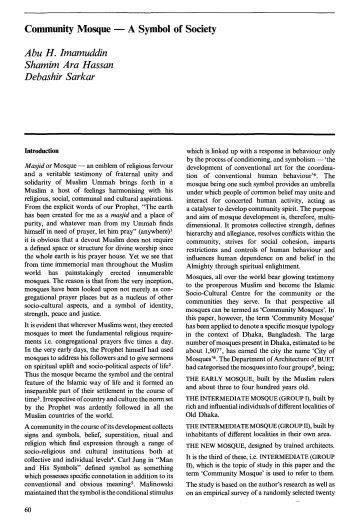
M asjid or Mosque – an emblem of religious fervour
and a veritable testimony of fraternal unity and
solidarity of Muslim Ummah brings forth in a
Muslim a host of feelings harmonising with his
religious, social, communal and cultural aspirations.
From the explicit words of our Prophet, “The earth
has been created for me as a masjid and a place of
purity, and whatever man from my Ummah finds
himself in need of prayer, let him pray” (anywhere)!
it is obvious that a devout Muslim does not require
a defined space or structure for divine worship since
the whole earth is his prayer house. Yet we see that
from time immemorial man throughout the Muslim
world has painstakingly erected innumerable
mosques. The reason is that from the very inception,
mosques have been looked upon not merely as congregational prayer places but as a nucleus of other
socio-cultural aspects, and a symbol of identity,
strength, peace and justice.
It is evident that wherever Muslims went, they erected
mosques to meet the fundamental religious requirements i.e. congregational prayers five times a day.
In the very early days, the Prophet himself had used
mosques to address his followers and to give sermons
on spiritual uplift and socio-political aspects of life2 •
Thus the mosque became the symbol and the central
feature of the Islamic way of life and it formed an
inseparable part of their settlement in the course of
time3 • Irrespective of country and culture the norm set
by the Prophet was ardently followed in all the
Muslim countries of the world.
I agree to the terms outlined below:
You agree to upload and assign Mosqpedia Database the rights to use the content worldwide and in perpetuity across all current and future media platforms. Mosqpedia Database may edit, copy, adapt and translate your contribution.
The content will be distributed under the Creative Commons Attribution-Deed – Attribution-NonCommercial-NoDerivatives 4.0 International – Creative Commons
All data will be stored in line with data protection regulations.